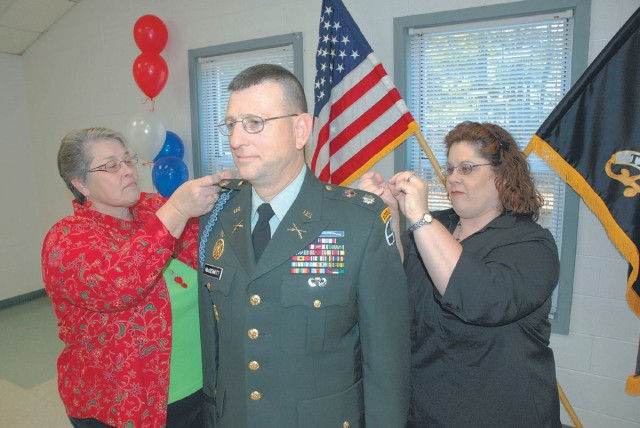
FORT JACKSON S.C. (Army News Service, Feb. 12, 2008) -- When the executive officer for Task Force Marshall was promoted Friday to lieutenant colonel at McCrady Training Area,
it was a moment Richard MacDermott thought might never happen. He likens his rise and fall through the ranks to the twists and turns of a roller coaster.
MacDermott enlisted in the Army in 1975, and then received a presidential appointment to the U.S. Military Academy at West Point, N.Y. He graduated as a second lieutenant in 1980. In 1993, after being promoted to major he resigned his commission. He spent the next 6 1/2 years working in Kuwait as a contractor.
In 2000, he wanted to return to serving in the Army. However, he learned that the only way he could continue in the Army was to enlist as a drill sergeant in the Army Reserve, which he did. Four years later, after reaching the rank of sergeant first class, he volunteered for mobilization to active duty at Task Force Marshall to train reservists for duty in the Global War on Terror. Then a year later, a talk with a fellow NCO helped send MacDermott's career back along the path it had started out on.
"A sergeant at U.S. Army Human Resources Command told me about a program he had read about where there was a wavier that could make me an officer again," MacDermott said.
After putting in the paperwork, the secretary of the Army waived his non-promotion status. In June 2006, he traded in his stripes for oak leaf clusters. "I didn't think that would ever happen," MacDermott said.
While his journey has been unusual one, MacDermott said it allows him to be more effective.
"It gives you a very different perspective that you can bring to the table," he said. "You can see where there are communication gaps due to the different levels of experience and views. I would like to think it keeps a better line of communication open and it allows me to understand how I can better communicate with my NCOs so we can achieve more together."

Social Sharing